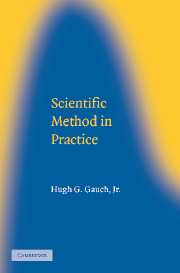Book contents
9 - CASE STUDIES
Published online by Cambridge University Press: 05 March 2015
Summary
The main thesis of this book is that the winning combination for scientists is mastery of the general principles of scientific method together with mastery of the specific research techniques of a chosen specialty. Neither can substitute for the other. Ordinarily, a scientist's training in specialized knowledge and techniques is strong. But all too often, training in science's history, philosophy, logic, presuppositions, and fundamental methods is weak.
The most compelling way to show that the general principles of scientific method matter is to give several examples of scientific research that are striking precisely because they incorporate an exceptional grasp of these principles. Accordingly, this chapter presents several case studies.
Recall that this book has two objectives, to increase productivity and enhance perspective. The first case study, concerning the elementary physics of motion, pursues a balanced perspective on science by defending science's credibility against the various philosophical attacks reviewed in Chapter 3. The remaining case studies, concerning advanced research in diverse pure and applied sciences, reflect remarkable productivity energized by an exceptional understanding of scientific method. It is hoped that reflection on these examples will suggest possibilities for some new advances using analogous applications in the reader's own specialty.
INTUITIVE PHYSICS
Recall from Chapter 3 that Sir Karl Popper, Thomas Kuhn, and other prominent philosophers have challenged the very foundations of science, citing four deadly woes: (1) Science cannot prove any theory either true or false. (2) Observations are theory-laden, and theory is underdetermined by data. (3) Successive paradigms are incommensurable.
- Type
- Chapter
- Information
- Scientific Method in Practice , pp. 327 - 366Publisher: Cambridge University PressPrint publication year: 2002



